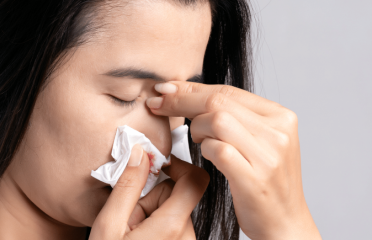When should I see a doctor about a nose bleed?
Most have no cause. They just happen, and get better. So you do not need to see a doctor.
What to do about a nose bleed
Nosebleeds can be frightening, as a little blood can go a long way. But they are not usually a sign of anything serious and most should be treated at home, or wherever you are having it (e.g. during a football or rugby game).
The medical name for a nosebleed is epistaxis. During a nosebleed, blood flows from one or both nostrils. It can be heavy or light and last from a few seconds to 15 minutes or more.
But. What should I do if I have a nose bleed?
If you are having a nosebleed, sit down and lean with your head tilted forward.
 Correct method of treatment
Correct method of treatment
Do not lean the head back as this can cause blood to trickle down the back of the throat and block the airway.
Breathe normally and calmly through the mouth and pinch the soft part of the nose. Use a clean tissue to catch any blood.
After 10 minutes, you can release the pressure on the nose. Pinch the nose again if the bleeding has not stopped. Do this for two further periods of 10 minutes.
What to do after the bleeding has stopped
Once the bleeding has stopped, keep leaning forward and clean around the nose with lukewarm water. Once clean, rest and avoid exertion or blowing the nose (to prevent disturbing the clots).
If the bleeding is severe, or if it lasts more than 30 minutes, call 999 for emergency help.
Summary
We have explained when should I see a doctor about a nose bleed. Rarely. We hope you have found it helpful.

